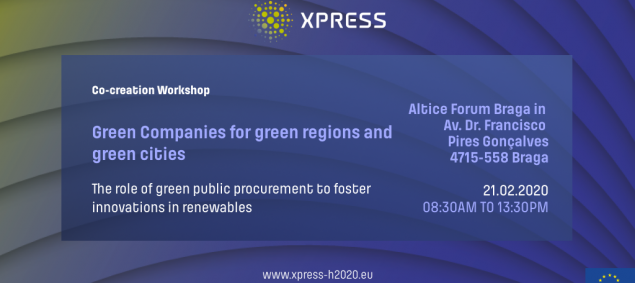The role of green public procurement to foster innovations in renewables

“The European Green Deal is our new growth strategy” so the President of the European Commission. The energy, industry, buildings and mobility sectors have never been at the centre of the public debate to this extent as today. While EU Institutions set the frame for new policies and programs for the future of a green and inclusive transition, regions, cities and companies are now struggling to make the most out of the current bureaucratic, financial and technological instruments to deliver on the challenges of the climate change.
Europe's public authorities are major consumers. By using their purchasing power to choose eco-friendly goods, services and works, they play a key role to foster sustainable consumption and production. This “green purchasing” is Green Public Procurement (GPP). GPP is also a strong stimulus for eco-innovation. In fact, it stimulates a critical mass of demand for more sustainable goods and services which otherwise would not easily get onto the market. But there are also barriers that need to be overcome. For examples, it may be difficult for a public authority to find an SME offering the “green” innovative services needed. Conversely, it may be a barrier to SMEs that procurement procedures at regional and municipal level are too complicated.
The workshop “Green Companies for green regions and green cities” gathers at the same table Portuguese regional and local authorities and innovative green companies as well as internationals researchers and experts.
The goal of this participative workshop is to together discuss and find solutions concerning:
• EU and Portuguese procurement rules with emphasis on the terms and conditions for innovative GPP;
• Latest international research on green supply;
• Barriers/Solutions to regional and public authorities to promote GPP;
• Barriers/Solutions to SMEs to apply for GPP.
The workshop will be held in English/Portuguese.
For the registration: – here in English and – here Portuguese.
AGENDA
08h30 – 09h00 - Registration of the participants and welcome coffee
09h00 – 09h15 - Introduction
EURADA welcomes the participants providing an overview of the workshop. Afterwards, a short presentation about the Horizon2020 XPRESS project and its initial project results is held.
Welcome
InvestBraga, representative
XPRESS presentation
Riccardo COLETTA, XPRESS project coordinator (APRE)
Dr Paola ZERILLI, XPRESS scientific project coordinator (University of York)
09h15 – 09h30 - Nanoscience and nanotechnology for renewable energy
Representative of the INL - International Iberian Nanotechnology Laboratory delves into the question how nanoscience and nanotechnology can deliver on renewable energy
09h30 – 10h30 - Showcase your green solutions
Three SMEs and three public authorities from Portugal showcase their best-practices; the first ones to offer innovative green services to regions and cities and the latter ones to make a smart use of GPP.
Introduction
StartUpBraga, representative
Representative, PT SME
Representative, PT public authority
Representative, PT SME
Representative, PT public authority
Representative, PT SME
Representative, PT public authority
11h00 – 11h30 - Coffee break
11h30 – 13h00 - Group work
First, an overview of the legal framework for green public procurement (GPP) in Portugal and in the EU is given. Then, the workshop’s goal and structure are detailed namely, to explore challenges, opportunities and barriers to overcome to better use GPP as tool to boost renewables (RES) investments and green innovations.
Legal input & workshop’s instructions
Expert, University of Minho
Dr Paola ZERILLI, XPRESS scientific project coordinator (University of York)
Group work
Participants work together facilitated by the XPRESS team to address the questions: A) How to boost innovations in RES through GPP; B) How GPP on RES contribute to the implementation of Sustainable Development Goals; C) How to support policy makers in boosting the RES market through GPP?
13h00 – 13h30 - Conclusions
Participants present the group work’s outcomes. APRE then draws the conclusions of the workshop.
12h30 – 13h30 - Networking Lunch

